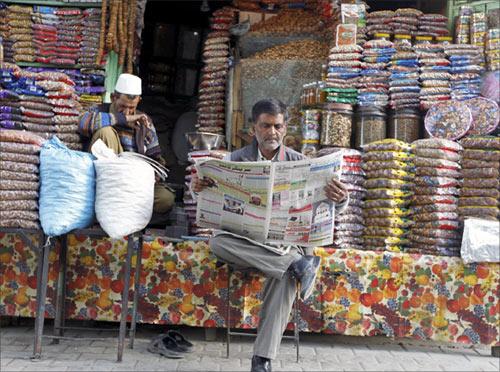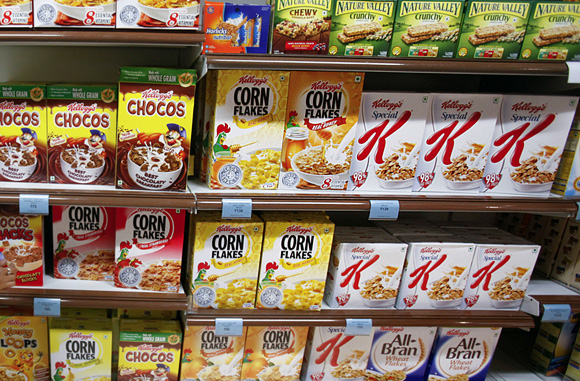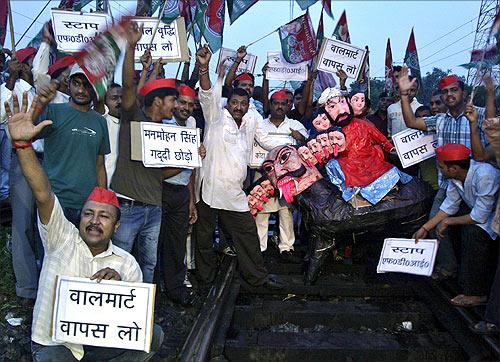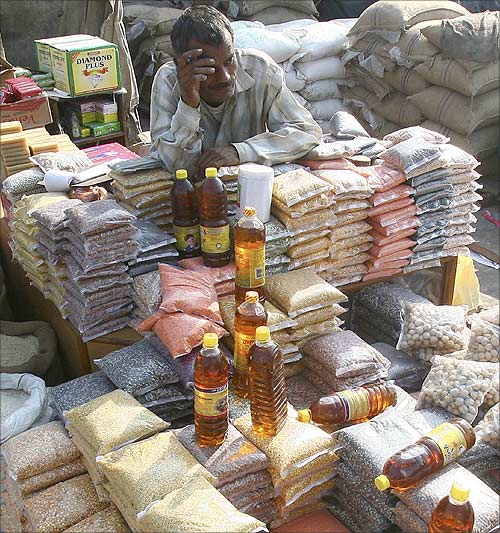Photographs: Danish Ismail/Reuters G V Dasarathi
It will be bad for the farmer and the consumer.
It will be bad for the poor -- urban and rural.
It will put a lot of people in the retail trade out of jobs, says G V Dasarathi who has been in charge of buying groceries for his family for 15 years.
I am the typical urban consumer who is supposed to be salivating at the thought of FDI in retail. Here is my little story that explains why I'm not only not salivating, but actually dreading the thought.
This story involves four actors: The FDI company store, the Indian Retail Chain store, the Mom-and-Pop grocery store and me. Let's call the first three FDI, IRC and MomPop.
I have been living in my locality in Bangalore for the past 15 years. I bought vegetables at the local HOPCOMS store that is ubiquitous in Bangalore. All other groceries I bought at a couple of MomPops half a kilometre away from my home.
If one of them did not have something that I wanted, the other would. I used to drop in a couple of times a week at the MomPops to buy stuff and chat with the owners about the day's news. The owners Venkatesh and Javed gave me free advice on what to buy, and in what quantity.
We asked about each others' family, who was doing what, etc. Sometimes the owner's wife would be managing the shop, and often his little daughter would be sitting at the back doing her homework or playing.
About three years ago, an IRC (Indian Retail Chain store) opened my locality very close to the MomPops. The IRC had everything that the MomPops had, and everything cost a little less.
Venkatesh and Javed started losing customers to the IRC, and every trip of mine to them had involved a little discussion on how they were worried about the future.
I was one of their diehard customers for whom the human touch mattered more than the small difference in prices, but there weren't enough people like me.
In less than a year both the MomPops closed down, along with another one nearby.
Please ...
Why I am against FDI in retail
Image: A supermarket in an Indian metro. Photograph used only for representation purposesPhotographs: Reuters
I was forced to go to the retail chain store after this, because the next nearest MomPop was 1 kilometre away across a busy traffic intersection -- an unpleasant walk. In less than a month after the MomPops closed, the prices at the IRC rose and the quality dropped quite dramatically.
What it stocked was expensive varieties of rice, dal and vegetables. I had to repeatedly complain to the management about products past their expiry date, bread with fungus and other such issues -- obviously a direct result of a lack of competition.
I actually had to fill in a form to get a replacement for the bread. Along with me, a lot of low income people too lost the convenience of the MomPops. I started cycling to the MomPop across the busy traffic intersection, and have been with this shop ever since -- Ganesh has replaced Venkatesh and Javed.
Why was the IRC able to push the MomPops out of business? Because it had deep pockets, could reduce its prices for a year, take away all the MomPops' customers and get them to close down.
What did the IRC do after it became a monopoly? Raised its prices and diluted its quality, because it had no competition.
An IRC is LARGE, and needs a whole locality dependent on it to survive, which means it has to kill off competition in the whole locality. An FDI (like Walmart) is HUGE, and needs 4 to 5 localities dependent on it, which means it would have to kill all the MomPops and IRCs in these localities.
If you have to travel 1 km to the nearest IRC, you will have to travel maybe 5 kms to the nearest FDI. This is exactly the situation in countries like the US. If you run out of milk, you drive 5 kms to the 'neighbourhood' FDI.
Please ...
Why I am against FDI in retail
Image: Samajwadi Party members protest against FDI in AllahabadPhotographs: Jitendra Prakash/Reuters
So, based on this personal experience, do I think FDI in retail makes sense to me as a (urban rich) consumer? NO. I don't even think local retail chains make sense, and avoid them like the plague.
As a consumer, I do not have a choice between multiple vendors and am forced to depend on a monopoly. The monopoly ensures that I do not get the best quality and price possible.
I lose the convenience of the neighbourhood store. I am forced to travel long distances for my purchases, and the cost and time of travel are added to the cost of purchase.
A key pro-FDI argument is that the FDI will buy direct from the farmer and eliminate a lot of 'middlemen', so the farmer will get better prices thereby leading to prosperity. This bogey of 'middleman' is a throwback to the socialist days of the 1970s, and needs to be jettisoned.
No commerce is possible without a sales chain between the producer and the consumer, and each link in this chain is a middleman. This is as true of vegetables or pulses as it is of garments or footwear.
Now, each farmer has a number of potential buyers and the buyers have to compete to get the farmer's produce, resulting in the best possible price for the farmer.
In the FDI-era what is likely to happen is this: A single FDI becomes the sole buyer of produce from farmers in a whole taluk or district, and dictates the (obviously low) prices.
The farmer has no other potential buyer, and is forced to sell at whatever price the FDI specifies.
Even worse, the FDI may decide one year that it is cheaper to import onions from Mexico or Pakistan, and import ship-loads of the stuff for its stores country-wide. So the farmer has nowhere to sell his onions that year because the monopoly buyer is not interested.
Please ...
Why I am against FDI in retail
Image: A salesman waits for customers at a grocery wholesale market in ChandigarhPhotographs: Ajay Verma/Reuters
The retail trade in India is the third largest employer after agriculture and textiles. FDIs are definitely going to make a lot of these people unemployed.
The FDIs will cater to the urban rich, and any supposed reduction in food prices is not going to benefit the poor, whether urban or rural.
What WILL benefit them is an improved public distribution system with less leakage.
Sensible cities worldwide are moving towards town planning that reduces commuting, with self-contained localities where workplaces, shops and entertainment are close to homes, reducing the need to use automobiles.
US-style town planning where you travel 5 kms to get to the nearest Walmart is obsolete, not sustainable. What is sustainable is small shops in each neighbourhood, not HUGE shops each servicing multiple neighbourhoods.
India's current account deficit and the devaluation of the rupee can be fixed by reducing the oil import bill. The fiscal deficit and inflation can be fixed by reducing diesel subsidies. Reducing dependence on petroleum by reducing the use of private automobiles is one of the keys to a healthier economy.
FDIs would promote more travel, more use of petroleum by consumers. This is another reason they don't make sense.
So in sum, FDI is going to be a monopoly buyer from farmers and a monopoly seller to urban rich consumers.
It will be bad for the farmer and the consumer.
It will be bad for the poor -- urban and rural.
It will put a lot of people in the retail trade out of jobs. It will increase fuel use.
So then who is FDI in retail good for?
Should it not be allowed at all?
Should it be allowed only for manufactured goods and processed foods, disallowed for raw foods (pulses, rice, wheat, vegetables and fruits, etc)?
Maybe it need a lot more dispassionate thinking and analysis before the nation decides on it?
G V Dasarathi is a resident of Bangalore, and the person responsible for buying groceries in his home for the past 15 years.





article